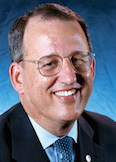The Carolina Way
Posted on July 15, 2006One of my early observations as a member of the Knight Commission on Intercollegiate Athletics was “not all fans are alumni, and not all alumni are fans.” Fans who are not alumni most often only care about the success of their favorite college teams. They have little, if any, involvement with or commitment to the college or university. There are some universities whose athletic booster club has more contributors or members who did not attend the university than alumni. Happily for Carolina, members of the Rams Club — also known as the Educational Foundation — are overwhelmingly Carolina alumni, accounting for roughly 90 percent of its membership.

Doug Dibbert ’70
What are reasonable expectations for Carolina fans, and what are their responsibilities? Carolina fans are expected to be respectful of players and coaches, ours as well as opponents. Carolina fans should be in our seats early and should remain until the contest is completed. (It is discouraging to players and coaches alike to see empty seats or to witness fans leaving before the competition ends.) Carolina fans try to provide our teams a home-court or -field advantage by “turning it blue” and cheering our teams loudly. We do not criticize the officials — even when we “know” they’ve missed or made a bad call, and we certainly don’t criticize or boo coaches or players, ours or the opponents’. Importantly, we know and support NCAA rules and regulations.
Our athletes and coaches know that it is a privilege to wear a Carolina uniform. Coaches and players are expected never to do anything that brings embarrassment to Carolina. They are expected to know and consistently follow the letter and spirit of all NCAA rules and regulations. Players understand that we have a long, proud tradition of athletes playing hard, playing smart and playing together. Players and coaches are grateful for much-needed fan support and are never critical of their fans. To the extent reasonable, players and coaches are accessible to fans.
Athletic participation teaches many positive things to young people — self-discipline, the importance of teamwork, sportsmanship, fair play, accepting defeat, handling victory and understanding one’s limits. Athletics also can bring an entire university together — faculty, students, staff and alumni.
The Knight Commission’s 1991 report, tided “Keeping Faith with the Student Athlete,” included this message to alumni: “As a product of your institution, you have a critical role to play in safeguarding its reputation. University presidents, faculty members and members of governing boards come and go, but you remain. In the marketplace, the value of your degree is based on your institution’s reputation today; not the reputation it enjoyed when you were students.You can help protect the stake you hold in that degree by insisting that the athletics program is directed along ethical lines.”
When Carolina alumni who are fans are in Chapel Hill for an athletic contest, they most likely have returned to renew their ties to their alma mater, to reconnect with classmates and sometimes faculty, and to share in the excitement of college sports. While alumni expect and deserve excellence in all that we do at Carolina, college athletes should not be expected to perform at the same level as professional athletes. Carolina coaches and athletes know that the athlete’s first obligation is to be a conscientious student and to earn a degree. Again this year, our 750 student-athletes have a remarkable record in the classroom with more than 300 having earned a 3.0 or higher GPA and nearly 270 making the 2006 ACC Honor Roll.
As Carolina alumni who also are Carolina sports fans eagerly anticipate another exciting year for our 28 men’s and women’s varsity sports, may each of our student-athletes and coaches and all of our Carolina fans recommit ourselves to doing all that we can to support our players, our coaches and our fans and to represent The University of North Carolina as always in the Carolina Way.
Yours at Carolina,

Douglas S. Dibbert ’70
